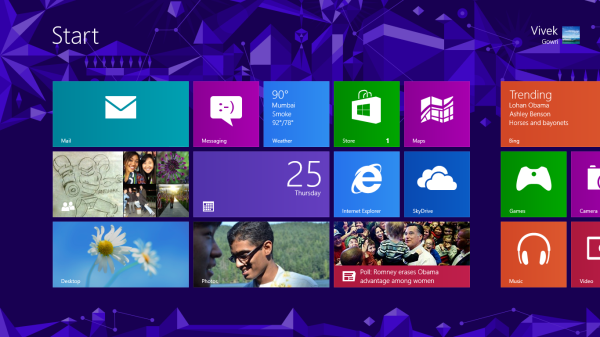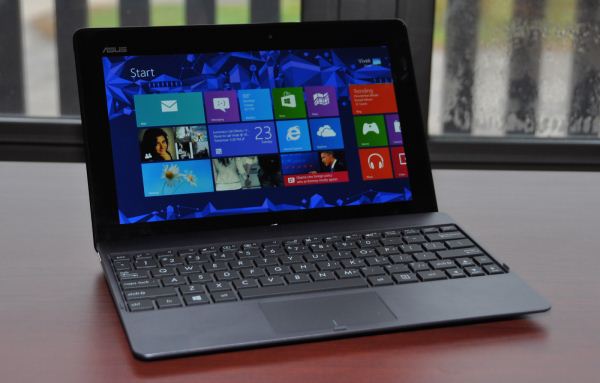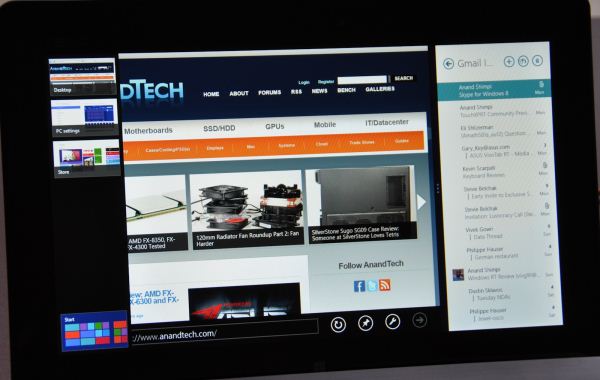The Windows RT Review
by Vivek Gowri & Anand Lal Shimpi on October 25, 2012 12:00 PM EST- Posted in
- Windows RT
- Operating Systems
- Microsoft
- Mobile
- Windows 8
- Tablets
Final Words
So, ten thousand words later, what can we take away from Windows RT? It’s definitely another superb user experience design from Microsoft. Say what you will about Windows Phone 7, but damn if that UI isn’t gorgeous. The Metro design language translates over to the tablet form factor really well, resulting in the Windows Modern UI. We’ve obviously known how Modern UI looks and feels through the various Windows 8 preview builds, but Windows RT ends up being more focused and offering a more consistent experience. It’s a side effect of being limited to apps from the Windows Store - because you spend a significant majority of your time in the new Windows UI, desktop use is minimized. In Windows RT, the Windows Desktop serves the purpose of being the more capable and powerful layer underneath the main portion of the UI, as opposed to Windows 8, which sometimes feels like the new Windows UI existing as an impractical interface layer on top of the traditional desktop.
The dichotomy just feels more comfortable in Windows RT than I feel like it has been in the previous Windows 8 systems that I’ve dealt with. It’s nice. This is the first time I feel like I’ve really connected with the new Windows UI, it makes a ton of sense to me now. I still think for mouse-based navigation, you’re better off treating it as a glorified Start menu, but it’ll be interesting to see how legacy programs affect the use of Modern UI in x86-based Windows 8 tablets as the Windows Store matures.
If you’re really concerned about the state of third-party apps, you just have to wait and see. I’ve seen a lot of snap judgements made about Windows RT in the last couple of days based on the dearth of good applications in Windows Store, and while I agree with that sentiment, I feel like it’s extremely shortsighted to write off the ecosystem already. Neither version of the OS has gone on sale yet, and we know that there are a number of applications that will go live on the official release date, as well as many more coming in the weeks ahead.
This isn’t like Windows Phone, where we need to see whether the platform will get any market traction before predicting the growth of the app marketplace. You can basically assume that the marketplace will expand significantly unless somehow everyone stops buying Windows-based systems on October 26th. The odds of that situation arising seem relatively low, so my bet is that the strength of the ecosystem will be a non-issue a month from now.
The default inclusion of Office 2013 and the emphasis on physical keyboards makes Windows RT the first tablet platform to significantly address the question of productivity. Combined with the equally advanced task switching and multitasking built into the UI, and this becomes the first legitimately useful tablet operating system out there. The Galaxy Note 10.1 wasn’t bad, but it was a single device that built additional functionality into a custom Android skin. Every single Windows RT slate comes out of the box with Office and the ability to have multiple active application windows. It’s just a few steps ahead of competing tablet platforms at this point.
And it’s not like RT loses out on a content consumption front. It’s paired with what is a very strong entertainment store and gaming franchise in Xbox Live, and the browsing experience is definitely competitive. It’s also a competent e-reader, with Amazon’s Kindle being one of the headlining apps currently in Windows Store. It even matches the power efficiency of the other ARM-based tablets, with competitive battery life and standby time. Obviously, ARM is the driving factor in the low power consumption, but it’s good to see that Windows is on a similar level as iOS and Android.
So this is a tablet platform that can do a good job of replacing both an iPad and an ultraportable in a number of different workflows. You get the best of both worlds, in some sense - Windows RT tablets have similar form factors to the iPad and leading Android tablets, and offer near-equal battery life, performance, and user experience, but they also give you the added benefit of strong productivity applications and the power of Windows Desktop. From a conceptual standpoint, almost anything you can do with an iPad can be done equally well (or close) on a Windows RT tablet, but the desktop-caliber office suite and versatile multitasking interface of Windows RT are impossible experiences to replicate on the iPad. It's not a perfect operating system by any means, but it brings a new dimension to the tablet space. So if you’re looking for a new tablet this fall, Windows RT deserves your consideration.













233 Comments
View All Comments
steven75 - Friday, November 2, 2012 - link
Yes, agreed 100%. This review seems to be by far the most certain the *metro* apps are going to grow by leaps and bounds than any other review I've read. I think there's definitely a chance RT and thus metro apps aren't going to take off at all.karasaj - Thursday, October 25, 2012 - link
Forgot to say thanks, great review! I was wondering about the smoothness of Surface etc - it doesn't seem like there will be much to worry about. Thanks again!nedjinski - Thursday, October 25, 2012 - link
Thanks for yet another sane and unbiased review. I find this approach the most helpful when considering a new purchase. You guys continue to have clear vision when it comes to the big picture and you don't get distracted by small details that will probably get ironed out in future iterations of the device.It looks like MS has a winner here.
Netscorer - Thursday, October 25, 2012 - link
While this is an overall very good and comprehensive review, I am still confused by two separate Windows 8 OS (with Windows Mobile 8 may be third). I just don't see how they are going to coexist long term. And if there will be convergence, which OS will be left out.I was hoping review would touch on those issues a bit more then spending page after page describing various apps that come built in and will undergo a significant change/enhancement shortly anyway.
haukionkannel - Thursday, October 25, 2012 - link
Well the Metro UI aplication will be very popular in Mobile platforms. Because both windows 8 versions can run those, there is no problem in there. If you want to run normal desktop application, video editing, AAA games, the normal 86 version of win8 is for you.If you have to chose between normal win8 and win8 RT pad, or tablet there is not very big difference. In most cases it is better for programmers to make Moder UI version of their program than to make only Intel CPU based version that runs only in normal win8 version. Thre will be more customers in Modern UI platform than normal. So instead of having bottle neck with old gaming consoles, the new botleneck will be the slovest win8 RT pad in most cases.
If you are serious gamer the normal win8 is for you. If you are interested in just getting pad for playing casual games like Angry bird, and reading www-pages, listening music, looking viodeos, etc, it does not matter what you get, if the price is good and ahrdware desent.
AmdInside - Thursday, October 25, 2012 - link
Waiting for MAME to be available for either Windows RT or Windows 8 before I buy a tablet.ludikraut - Thursday, October 25, 2012 - link
Oh yeah, MAME on a tablet will rock.l8r)
jecastejon - Thursday, October 25, 2012 - link
I am interested, reading and taking notes but is this Windows RT a netbook-nettop OS at a higher price point?I think I will wait at least 2-4 years to consider an ARM-Atom based computer to produce even some light work, as for a device to have fun there are tablets, Nintendo, PSP, iDevices with thousands of apps or games. WRT is not that cool, it does nothing better as an entertaining system but it may be great to produce very light or limited work on the office and just probably on the go but even for that it will need to compete with entry-laptops and ultralight machines.
Right now this is a very hybrid concept targeting for a broad marked but I just can see a niche market I am sure it will reach. I think in part the price is to high and it will be kind of a business ultra light high end system.
diamondsw2 - Thursday, October 25, 2012 - link
"85% (or more) of computers being sold worldwide"I assume you're not including iPad sales - which is very misleading for a tablet OS review. And if you're more broadly talking Windows 8 all of a sudden (RT != 8), the overwhelming majority of Windows sales are to businesses - and those businesses are going to exercise their downgrade rights and not touch Windows 8 with a ten-foot pole. There's no business case for it over Windows 7, and the training is far from insignificant. It's not going to get any headway there for years.
Consider be very skeptical on actual uptake of Windows 8 or its supposed marketshare. I'll bet it's six months to a year before I see the first person using it (which may say more about how many of my PC-using friends have converted to iPads and Macs). I fully expect every Windows PC I see to be on 7 for a long time to come).
PsychoPif - Thursday, October 25, 2012 - link
Just from a quick search, I've found that Apple sold 15.4m IPad vs 49.8m for the top 4 OEM. It does'nt include the other manufacturer and it's still 70% marketshare.85% might be high, but don't make it sound like Windows won't be on the vast majority of computer sold this year.